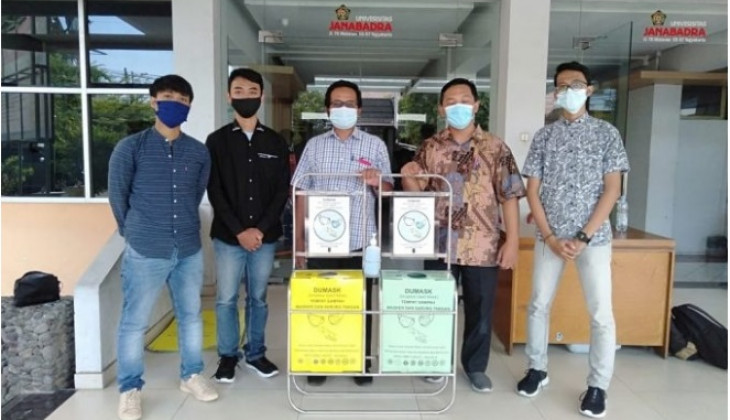The problem of waste masks and plastic gloves has now become a problem in itself throughout the world. Indonesia is no exception because due to the Covid-19 pandemic, masks and gloves pose dilemmatic problems.
On the one hand, masks and gloves help people around the world avoid the virus. On the other hand, they are very dangerous to the environment. Previously, hospitals were thought to be the largest producer of medical waste. Now masks and gloves contribute to daily waste in most people.
Data compiled by the BBC globally shows that the world’s population wears 129 billion masks and 65 billion single-use plastic gloves every month during the Covid-19 pandemic. In fact, during the Covid-19 pandemic, the waste of masks and gloves became a new wave after plastic pollution.
Medical waste that is not disposed of according to existing regulations might cause problems. Those that end up on land or water are at risk of endangering animals and existing ecosystems.
“Throughout 2020, there has been a lot of evidence in the field that used masks can ensnare animals such as birds and turtles, which lead to death,” said Chandra Wahyu Purnomo, ST, ME, M.Eng, D.Eng, at PIAT UGM on Friday. (30/4).
Seeing these problems, according to him, proper waste management is needed to prevent the spread of disease, and in addition, to minimize environmental impacts and take advantage of existing potential for further use.
Chandra said that starting from these concerns that Universitas Gadjah Mada (UGM) collaborated with Institut Teknologi Bandung (ITB) and Universitas Sebelas Maret to create a program on the medical waste management system for disposable masks and plastic gloves to minimize the impact of waste on the environment. The waste management system is named Dumask (Dropbox-Used Mask).
“We created Dumask with a special purpose to provide a safe and environmentally friendly disposal route for used masks and gloves from the general public,” he said.
As the lead researcher in the Dumask project, he explained that the Dumask project was funded by the Indonesian Collaborative Research Program (PPKI), which started from February-October 2021. The project started with collecting waste masks and gloves using boxes and creating applications to monitor dropboxes and the burner.
This Dropbox can be placed in several locations. When the box is full of trash, it will send notifications to applications and websites. Next, the officer will come and take the box, and the medical waste will be destroyed by high-temperature heating or better known as the pyrolysis method.
“Coincidentally, UGM has a Recycling Innovation House (RINDU) facility located at the Agrotechnology Innovation Center (PIAT). RINDU is a center for processing and developing waste and waste technology and has adequate waste destruction equipment using thermal technology,” he said.
Chandra said that this pyrolysis reactor will later be developed at other partner universities. This program also received support from Airlangga University, Ahmad Dahlan University, ATK Polytechnic, Janabadra University, and Proklamasi 45 University, all of which are members of the Indonesia Solid Waste Forum (ISWF).
In more detail, Chandra explained that one 30 liter volume box can accommodate around 500 used masks/gloves. After the box is full, it will be sealed and destroyed by thermal technology and an incinerator.
“For a technology that is currently still using heating from a gas stove fire,” he explained.
The materials for making Dumask are cardboard boxes and stainless steel containers. Therefore, the production speed is highly dependent on the speed of the box company and workshop.
The cost per carton box because it is still a small scale which costs 50 thousand rupiahs. This price will be much cheaper if it is mass-produced.
“The current obstacle is finding a large capacity custom cardboard box manufacturing industry which is quite difficult in Yogya. Another difficulty is inviting the public to throw away the trash, especially masks and gloves, to the dropboxes that have been provided,” he explained.
Chandra also hopes that local and provincial governments can immediately adopt the Dumask project. Hopefully, Dumask can make a real contribution to the management of medical waste during the Covid-19 pandemic.



